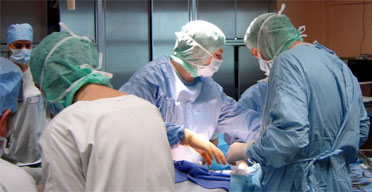
A British hospital is set to give the go-ahead for four British patients to undergo face transplants in what will prove a major landmark in surgery.
The ethical committee of the Royal Free Hospital in north London is expected to announce on Wednesday that it will approve the first operations for a full-face transplant. The recipients have not yet been selected but several potential candidates have already been seen by doctors.
The move marks the final hurdle for the team of plastic surgeons and specialists at the hospital who have spent the past 12 years investigating the possibility of face transplants. They have carried out studies that they say show a transplant is not only physically possible but would have huge psychological benefits for people left disfigured by accidents or burns.
Simon Weston, a veteran who suffered terrible burns in the Falklands war, will accompany a team of doctors to the committee meeting this week to explain why he feels the medical community must allow face transplants in Britain. He was initially against the move but has looked at their work and come down in favour of it.
The world's first face transplant took place last November when a French factory worker, 38-year-old Isabelle Dinoire, underwent surgery after being mauled by her labrador. She now has feeling back in her face and has talked about how the operation has transformed her life.
The Royal College of Surgeons, however, has been reticent about the prospect of such transplants in Britain. It produced a report last year that concluded more research was needed to show that a new donor face transplanted on to a recipient would not be rejected by the body's immune system. New animal studies have shown that problems over how immuno-suppressant drugs work may not be as serious as anticipated.
For Peter Butler, the surgeon who will carry out the transplant, Wednesday's decision represents a final breakthrough. He has already been given permission on three other occasions to carry out different parts of the preparatory work, including talking to potential patients to assess their psychological state.
If he does get the go-ahead - and there is a possibility that the ethics committee may call for a further delay - then the timing of the first operation would be determined by when the patients were ready to proceed with surgery. Butler told The Observer last night: 'We have done everything we can to prepare for this surgery, and we would like to go ahead - at some point the jump has to be made and people have to say yes. The time is right to start this surgery.
'We don't know how people will react. Does the government want us to go ahead with this? We just don't know. But a huge amount of work has been done with the group of patients who might benefit from this surgery.
'Many of them have very disfiguring injuries and spend their lives indoors, so for them this is not just life-enhancing surgery, it is lifesaving because it gives them back the chance to rejoin society.'
Butler said he doesn't want to choose just one patient but instead has asked to select four or five people who would be appropriate for the surgery. 'One person becomes a phenomenon whereas four would give it more scientific validity,' he said. Butler is also aware that there will be enormous media pressure on the patients, but believes that if they could support one another life would be easier.
He said: 'I feel the time is right to move on. You can do more and more research but at some point the leap has to be made, and people have to say, "OK, we've done our preparation, let's get behind this."'
Professor Jean Michel Dubernard led the French team who carried out the first facial transplant. The patient, Ms Dinoire, has talked about the enormous difference the surgery has made to her life and said recently: 'I now have a face like everybody else. I will be able to live again. I hope this operation will help other people too.'
She still receives an anti-rejection treatment every week and takes 10 pills every day. Several times a day she must also examine a small patch of skin from the donor on her stomach that would alert her if the tissue was being rejected.
For Butler and the psychologists who have been working with him, assessing the psychological impact of the transplant is just as important as the physical process.
Over the past three years they have interviewed 29 potential candidates and asked them how they feel about their appearance and, crucially, how they would feel about taking on the face of a donor. The first four patients will not necessarily be taken from this group.

